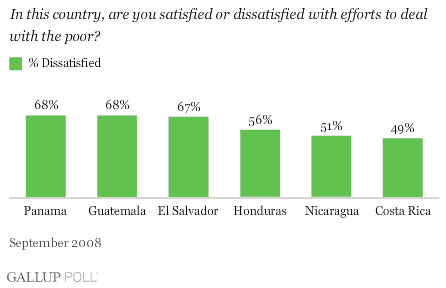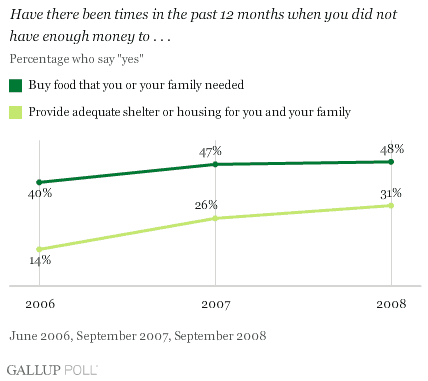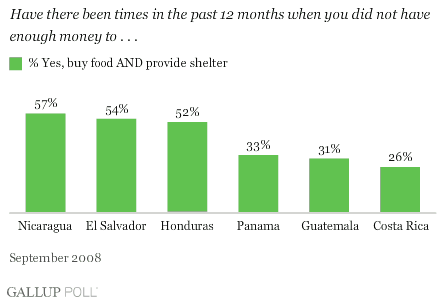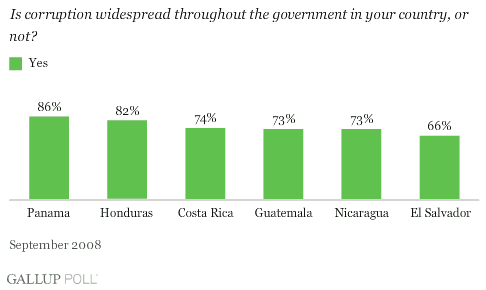Irvine, Calif. -- When Salvadorans elected Mauricio Funes of the Farabundo Marti National Liberation Front (FMLN) as president on March 15, they sided with a different political party than the one that has been in power for the past 20 years. Sour conditions in El Salvador, including sustained levels of poverty and corruption, may have fueled Salvadorans' desire for change; 67% told Gallup last September they are dissatisfied with efforts to deal with the poor -- one of the highest rates in Central America.

Funes' campaign -- like that of his opponent, Rodrigo Avila of the incumbent National Republican Alliance (ARENA) party -- focused on the country's struggle against poverty. Although El Salvador is home to one of the largest economies in Central America, the majority of its wealth is distributed among a select few. Its score on the United Nation's Human Development Index consistently ranks lower than the Latin American average.
Currently, the country has one of the 10 lowest per-capita GDPs in all of Latin America. Since 1999, its growth rate has never exceeded 5%. And in 2008, El Salvador's GDP real growth rate was 3.2%, which is one of the lowest in the region and down from its 4.7% rate in 2007.
Furthermore, during each year Gallup has polled in El Salvador, substantial percentages of respondents reported not having enough money to provide for their family. In 2007 and 2008, almost half of respondents reported that there had been times in the past year when they could not afford food for themselves or their families; this is up from 40% in 2006. Since 2006, a growing number have also reported having trouble affording shelter.

The numbers of Salvadorans reporting that there have been times when they did not have enough money for shelter more than doubled from 2006 to 2008. Salvadorans trailed only Nicaraguans in populations surveyed in Central America in 2008, regarding their reported struggles to afford food and shelter.

The poverty numbers make it clear why some Salvadorans may be willing to risk the first transition of power in their young democracy's history. While ARENA provided the stability residents sought after suffering through 12 years of civil war, the party was unable to cope with the nation's poverty, a common failure in Latin America.
In addition to eradicating poverty, Funes' campaign promised to create trust and eliminate corruption -- two key issues for Salvadorans. In 2008, two-thirds of Salvadorans (66%) said they perceived corruption to be widespread in their government -- the lowest number recorded in Central America but still a majority of the population.

Bottom Line
To follow through on his campaign platform, Funes does not have a lot of time to rest and celebrate what he called "the happiest night of my life." El Salvador's president-elect has a lot of work to do to reform his country, where many citizens perceive problems with poverty and corruption.
Besides trying to reduce poverty and corruption, Funes' main challenge is to create trust and confidence in his FMLN party, which was associated with violence for many years. Funes is inheriting a divided country, among the Salvadoran public and the Legislative Assembly, which he will need to deal with in his efforts to curb poverty and corruption.
Survey Methods
Results are based on face-to-face interviews with 1,000 adults in El Salvador, aged 15 and older, conducted June 2006; 1,001 adults in El Salvador, aged 15 and older, conducted September 2007; and 1,000 adults in El Salvador, aged 15 and older, conducted September 2008. For results based on total sample of national adults, one can say with 95% confidence that the maximum margin of error is ±3.4 percentage points for 2008, ±3.1 percentage points for 2007, and ±3.4 percentage points for 2006.
In September 2008, surveys were conducted in Latin America, results are based on face-to-face interviews with 1,000 adults in Costa Rica, aged 15 and older; 1,001 adults in Ecuador, aged 15 and older; 1,000 adults in Guatemala, aged 15 and older; 1,000 adults in Honduras, aged 15 and older, conducted; and 1,004 adults in Panama, aged 15 and older. For results based on total sample of national adults, one can say with 95% confidence that the maximum margin of error is +3.4 percentage points Costa Rica, +3.5 percentage points Ecuador, +3.4 percentage points Guatemala, +3.3 percentage points Honduras, and +3.3 percentage points for Panama.
In addition to sampling error, question wording and practical difficulties in conducting surveys can introduce error or bias into the findings of public opinion polls.
